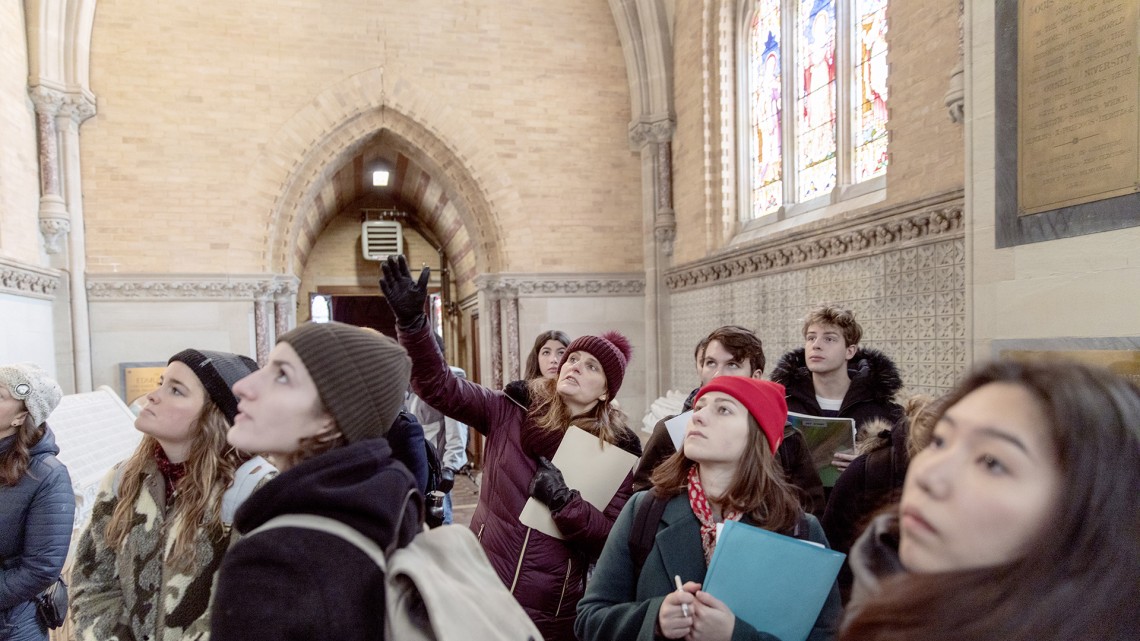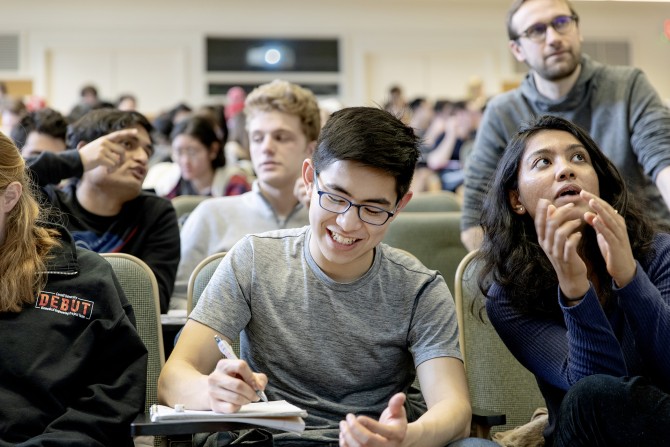
Classics students explore Sage chapel with instructor Verity Platt.
News directly from Cornell's colleges and centers
Active Learning Initiative awards 5 new grants
By Dave Winterstein
The Active Learning Initiative (ALI) has awarded a new round of grants, helping 5 departments redesign courses to implement research-based active learning strategies and create sustainable improvements to undergraduate education at Cornell.
ALI is a collaborative effort: faculty work closely with ALI postdocs and experts from the Center for Teaching Innovation (CTI), and departments are increasingly collaborating with each other. This will result in the new grants supporting enhancements to 24 classes, facilitating new learning experiences for students across campus.
The 2022 grant recipients are Classics, History, Government, Mechanical and Aerospace Engineering, and Biomedical Engineering.
“What struck the selection committee about all the winning proposals was that the faculty are deeply committed to improving undergraduate learning experiences through innovative strategies to teach complex analysis skills, problem-solving, and design,” said Julia Thom-Levy, vice provost for academic innovation.
With its new grant, Classics will continue transforming its English-language undergraduate curriculum. The department will implement active learning strategies to make the curriculum more inclusive in four courses that address issues relevant to both Classics and the modern world. These courses, addressing the ancient world’s treatment of race and ethnicity, gender, human rights, social justice, and climate change, will engage students across the university.
The Department of History will use its grant to develop one new course and redesign five others with the help of two postdoctoral fellows. The courses will address the current, urgent need to train students in media literacy and evidence-based knowledge. The new course, The deep fake: Conspiracies throughout history, will teach undergraduates sophisticated techniques for interpreting the evidence and sources that inform media, news, and history.
The Department of Government grant will support a transformation of four key courses in the major, employing a range of teaching strategies to improve student retention of core concepts and build deeper understanding of research design and statistical methods. The department believes a more hands-on approach to political science will enhance student engagement with the material and improve learning outcomes.
The Sibley School of Mechanical and Aerospace Engineering will use its grant to revolutionize laboratory instruction, creating learning studios to replace traditional lab courses. The studios will focus on three engineering systems: forklift, robot, and satellite; each integrating laboratory experiences across 5-10 classes. Studios will be central hubs for students of any skill level within all years of the program, connecting classes and concepts across the curriculum. Moreover, the change will affect all required classes in the curriculum and one third of all classes in the school
With its grant, the Nancy E. & Peter C. Meinig School of Biomedical Engineering will employ teaching principles used in architectural design education to transform its 6-course, core undergraduate sequence. This is the first step in a plan to expand design education to address challenges students face in bridging conceptual knowledge with practice and improving their ability to integrate knowledge across scales. With the new approach, students will work in small groups to model, analyze, and design products to present in class during feedback critiques. The department believes the new teaching strategy, paired with emphasis on applying engineering analysis to complex biology, will improve students’ proficiency and prepare them for the variability and uncertainty common in their careers while building essential communication and teamwork skills.
Developed with help from Alex Hanson ’87 and Laura Hanson ’87, ALI is supported by Cornell's Office of the Vice Provost for Academic Innovation and the Center for Teaching Innovation (CTI). The College of Arts and Sciences and the College of Engineering are also providing support for the new projects. To date, ALI has supported 19 departments in transforming curricula, enhancing learning for thousands of Cornell students.
Dave Winterstein is a communication specialist at the Center for Teaching Innovation.
Media Contact
Get Cornell news delivered right to your inbox.
Subscribe

